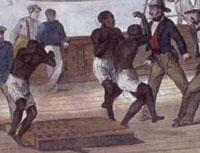Black history goes beyond slavery (Part II)
… continued. Click here to read Part I.

Although the ancient Etruscans, who were Indo-European, were matriarchal, their matriarchal culture and budding civilization was actually due to the influence of trade with the ancient Phoenicians (Canaanites) who were Hamitic and matriarchal. The ancestors of the ancient Egyptians, therefore, were not the patriarchal Indo-Europeans from the North as white supremacists would have us believe but rather the matriarchal black Africans from the South (Upper Egypt). Geographically speaking, the southern regions of ancient Egypt are referred to as "Upper Egypt." The reason for this is explained below in another paragraph.
It should be understood that the people of North India and Europe share a common linguistic and racial heritage and that is why they are referred to on the whole as being "Indo-European." The people of South India (comprising four states and making up roughly twenty-five percent of India's total population) are linguistically and racially known as Dravidians. The Dravidians of India are generally shorter, broader-nosed, with dark brown to black skin complexion and straight or wavy hair. Both archaeological and linguistic evidence shows that it was the ancient Dravidians who built the Indus Valley civilization (also known as the Harappan Civilization which was one of the world's four oldest civilizations after Mesopotamia and Egypt). The ancient Harappan civilization existed in what is now Pakistan. The Dravidians of the Indus Valley were conquered, killed in great mass, and enslaved by white nomadic barbarian invaders called Aryans who came from the north.
The Dravidians who escaped Aryan enslavement or slaughter fled to the south and were able to hold their own against any further Aryan encroachment and advancement, and that is why the linguistic and racial make up of South India is different from that of North India. Of course, over the centuries there has been so much crossbreeding between the two peoples that neither the north now is purely Aryan nor the south purely Dravidian anymore. Historian, anthropologist, and educational psychologist Dr.Clyde A. Winters has provided much painstaking research and numerous resources and references showing the ultimate cultural and phonetic/linguistic links between the peoples of South India and Black Africa. It is worth visiting his site C.A. Winter's Homepage.
Another excellent, scholarly, well-documented, and highly acclaimed book for study on this subject is The African Origin of Civilization: Myth or Reality by well-known West African scientist, scholar, and Egyptologist Cheikh Anta Diop. The book is generally available at bookstores or may be ordered through any bookstore. The book may also be purchased over the Internet. Although I agree with most of what Dr. Diop says in his book, I do strongly disagree with his support of Darwinian evolutionary theory concerning human origins and his belief that Judaism and its offspring Christianity is a by-product of Egyptian civilization. There is no doubt that some Judeo-Christian themes, principles, and truths existed in civilizations and cultures much older than that of the Hebrews (the Jews). The concept of one God, for example, was also believed and promoted in ancient Egypt by a certain pharaoh before there ever were Hebrews or Jews who possessed this truth. Elements of God's original truth have been scattered in all cultures of the world including that of ancient Egypt, but I believe (and with good reason) that God uniquely revealed Himself to the Jews in such a way that He gave them His truths unmixed with any errors.
The Christian Scriptures teach that the Jews were not selected by God because they were deserving or because they were a great people, but precisely because of the opposite. God delights in using the lowly, undeserving, and insignificant to accomplish His great purposes, and it was God's marvelous plan and purpose to use the lowly, undeserving, and insignificant Jews as His instrument to bring all mankind unto Himself so that both Jews and Gentiles in Christ become equally His children with eternal promises and blessings. It should be noted, however, that almost none of the Jews in modern Israel are descendants of the original Jews of Palestine thousands of years ago. Most of the Jews in Israel today are descendants of Europeans who had converted to Judaism in the Middle Ages (known as Khazar or Ashkenazi Jews).
It is important over-all to remember that there were both primitive and advanced black societies in ancient Africa just as there were also both primitive (barbarian) and advanced white societies in Europe during ancient times. However, keep in mind that Western (or White) civilization came on to the world's scene thousands of years after Blacks had already established and built their civilizations, notably Egypt. There is good reason to believe that the ancient Greeks borrowed much of their philosophy, religion, mathematics, and sciences from the Egyptians. Of course, the Greeks definitely modified and gave their own Greek names to these concepts which they learned and borrowed from the Egyptians.
Many prominent ancient Greek philosophers admitted in their own writings (of which we have a record) that they learned their scientific and mathematical concepts in Egypt. Writers and publishers of modern history textbooks make sure not to mention or include these confessions. The simple fact is that history shows that the ancient Greeks never really advanced as a society or people until they made contacts with Egypt. Then, as they say, they really took off. In fact, it would not at all be pre-mature to say that the Black society and civilization of ancient Egypt jump- started Greek civilization which in-turn jump-started all Western or European civilization. An excellent and scholarly article to read which summarizes the various historical and archaeological evidences which exist supporting the Black heritage of ancient Egypt is Ancient Egypt: Africa's Stolen Legacy published in "New African" magazine.
Another one is Still Out of Africa written by Dr. Charles S. Finch, III, M.D. of Morehouse School of Medicine. And, still, another very excellent and quite comprehensive website is: Ancient Africa's Black Kingdoms. If you wish to read an excellent essay which explains why the hair found on Egyptian mummies is straight rather than woolly go to: Hanging In The Hair. Please understand that the purpose of my web page, which you are now reading, is to provide only general information. It is not my purpose here in this site to present detailed documentation and references. Such necessary and important detailed documentation and references are available through contacting the sources that I mention on this page. One must realize that geographers refer to northern Egypt as "Lower Egypt" and to southern Egypt as "Upper Egypt." The reason for this is because the Nile River in Egypt, unlike other rivers of the world, flows from the south to the north. So up the Nile is actually going south and that is why the southern part of Egypt is called "Upper Egypt" and down the Nile is actually going north and that is why the northern part of Egypt is referred to as "Lower Egypt."
In ancient times the border of southern (or "Upper") Egypt was much further south than where it is today. Upper Egypt in ancient times extended well into what is now the country of Sudan (known in ancient times as Nubia or Kush). It was from Upper Egypt (Nubia or Kush) that the first pharaoh of Egypt Narmer (also known as Menes) went out to conquer and unify all of Egypt into one nation or kingdom. It was from here (the South) that the original ancestors of the Egyptians, following the direction of the Nile River north, settled the land of Egypt. The Egyptians themselves recorded in their writings that their ancestors came from the south. For example, the Edfu text (which is an inscription still found in the Temple of Horus at Edfu) states: "Several thousand years ago, we were led by our king from the South to settle up the Nile Valleys."
Western Egyptologists and historians continue to ignore such evidence and will certainly not publish it in school history textbooks. Western Egyptologists and historians continue to use the specious argument that the ancient Egyptians and Nubians (also known as Cushites) could not have belonged to the same race because they were separate countries and throughout history they fought one another for supremacy. But, ancient history shows us that separate nations that were white also fought one another (i.e. the ancient Romans and Gauls), but no one would argue that because of this the people of those nations didn't belong to the same race. Egypt was originally a colony of Nubia (Kush or Cush) but eventually separated from Nubia and became independent and even stronger than Nubia. In fact, the 18th dynasty of Egypt was a Cushitic (Ethiopian) dynasty when Ethiopia finally over-powered and conquered Egypt.
Throughout history both nations (Egypt and Cush) fought one another for political dominance even though both belonged to the same Black race. When the Jews were enslaved in Egypt they adopted many of the Egyptian customs including the Egyptian prejudices towards the Cushites. That is why we read in the Bible that after the Jews left Egypt Miriam (Moses'sister) criticized Moses for marrying a Cushite woman. The language of the ancient Egyptians was related to the black nation of Kush (Nubia) to the south. There is nothing, absolutely nothing, in the language of the ancient Egyptians that is related to Indo-European or Semitic. Ancient Egyptian language was not Afro-Asiatic as Western historians presently claim. It was entirely Hamitic.
There were also early black civilizations in Asia (such as the Sumerian civilization of Mesopotamia, for example, before various Semitic peoples entered and dominated the region). In fact, according to the Bible the descendants of Ham first settled in Asia (i.e. Mesopotamia and Arabia) before entering Africa. But, such black societies or civilizations which existed originally in Mesopotamia or Asia were not Semitic in origin, and, therefore, they were not Asian in that sense. Ancient Sumerian language truly was related to the Africoid or Hamitic languages of ancient Nubia and Egypt because they were essentially one people even though the Sumerians, who were blacks, built their civilization in Mesopotamia (Asia). This is not to say that Semitic peoples did not live in the region at the time of the Sumerians. Such Semitic peoples would probably have used the Sumerian language as the common language just as French persons today in the United States, for example, would use English as their common language. As was mentioned, the Sumerian civilization in Mesopotamia was later replaced by various Semitic cultures and peoples. Of course, long after the ancient Nubians and Egyptians had established their civilizations, Hamitic peoples mixed with Semitic peoples on the East African coast resulting in languages that were both Hamitic and Semitic in character, but the language of the original Egyptians was completely Hamitic from its foundation all the way up.
To get around all of this, Western Egyptologists and historians say that even though ancient Egyptians used a language connected to a black race and nation (the Kushites of Nubia) the Egyptians themselves, however, were white. That is why Western Egyptologists and historians refer to the ancient Egyptians as white Hamites even though there is not a shred of objective evidence to support this twisted hypothesis, and, in fact, there is an abundance of evidence to contradict it, not to mention plain good old common sense and logic.
Western historians and Egyptologists would never apply such deficient logic and reasoning to other disciplines, but when it comes to the race of the ancient Egyptians their minds will bend over backwards to deny the predominantly Negro origins of ancient Egyptian history and civilization. This has not been the case with all Western historians and Egyptologists but it has generally been the case - with very few or rare exceptions. The interesting thing is that Eurocentrist Egyptologists and their radical supporters like Dinesh D'Souza and Lefkowitz who oppose scholars such as African Egyptologist Diop never give specific reasons as to why Diop, for example, is wrong. They will say that Diop's arguments are unsound, but they will never explain how or why they are unsound.
The comprehensive scientific evidences and logic presented by Diop are never addressed or refuted specifically by these opponents, but only generally. It is also interesting to note that Diop was head and shoulders above over other Egyptologists in his formal education and in his scientific (he was a physicist), linguistic, and Egyptological credentials. Today Egypt is referred to as an Arab nation, but this is only because the Arabs conquered Egypt centuries ago and imposed upon the original people their Arab language, culture and Moslem religion. Many modern Egyptians of today are really the descendants of Arab, Persian, Greek, and other non-African peoples that entered into Egypt over the many centuries.
The ancient or original Egyptians, however, were of African or Black (Negroid) descent, and this is still mostly true of the bulk of Egypt's rural population, especially in the south. Long before the Arabs invaded and conquered Egypt the famous and ancient Greek historian Herodotus (who is known as the Father of History) visited Egypt and wrote concerning the Egyptians: "They have burnt skin, flat noses, thick lips, and wooly hair" (Herodotus, Book II, p. 100, translated by George Rawlinson, New York: Tudor, 1928). Readers may wish to obtain the book Return to Glory. The book, written by white author and professional speaker Joel F. Freeman, discusses the historical and archaeological evidences for ancient black Egyptian civilization.
Now to get back to our subject. Even though Noah had pronounced a terrible curse on Canaan, the curse did not apply to the blacks of Africa who were taken as slaves to the Americas because those blacks were not descendants of the Canaanites. It must also be understood that the curse applied to the Canaanites in a national sense only. That is clear from the context of Scripture. Individual Canaanites in history who trusted in the true God were delivered from the curse (i.e. Rahab the harlot mentioned in the Book of Joshua in the Old Testament. The same Rahab is mentioned in the New Testament as being an ancestor of our Lord and Savior Jesus Christ). As to why Noah pronounced a curse on Canaan for a sin that his father Ham had committed is not clearly explained in the Bible.
In one sense it could be said that Ham was punished in his son Canaan. It also might be that Noah foresaw by revelation from God that Canaan would more likely follow and take after in the immoral footsteps and behavior of his father Ham. We know from history that the Canaanites practiced very gross sexual and other forms of immorality - even to the point of sacrificing their children in the fire to their idols which they worshipped and for this they were ultimately cursed with extinction as a nation.
The author, Babu G. Ranganathan, is an experienced Christian writer. Mr. Ranganathan has his B.A. degree with concentrations in theology and biology. As a religion and science writer he has been recognized in the 24th edition of Marquis Who's Who In The East. The author's website may be accessed at: www.religionscience.com.
Subscribe to Pravda.Ru Telegram channel, Facebook, RSS!





